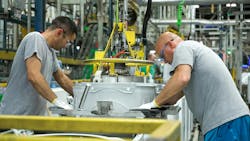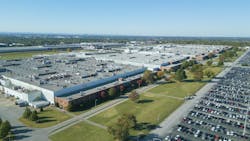GE Appliances Invests $490 Million to Create Advanced Laundry Plant at Kentucky Headquarters
Home appliances manufacturer GE Appliances has announced an investment of $490 million at its Louisville, Kentucky, headquarters to create a manufacturing plant for clothes washers production. Expected to create 800 new full-time jobs, the project will reshore the GE Profile UltraFast Combo Washer/Dryer and the GE and GE Profile UltraFresh Front Load Washer line-up from China.
“We are bringing laundry production to our global headquarters in Louisville because manufacturing in the U.S. is fundamental to our ‘zero-distance’ business strategy to make appliances as close as possible to our customers and consumers,” says Kevin Nolan, president & CEO, GE Appliances. “This decision is our most recent product reshoring and aligns with the current economic and policy environment.”
GE Appliances, which was sold to China’s Haier in 2016, will move the production of over 15 models of front load washers to Building 2 at Appliance Park. The plant will include in-house manufacturing of critical parts like stainless-steel baskets and cabinets, high-precision metal stamping and forming and injection-molding and production equipment, according to the company announcement.
Along with the top load washers and front load dryers produced in Building 1 at Appliance Park, the total area of clothes care production will be the equivalent of 33 football fields.
“Manufacturing in Louisville puts production closer to our designers, engineers and consumers so that together we can create our most innovative laundry platforms,” says Lee Lagomarcino, vice president, clothes care, GE Appliances.
Longbow Research President/Senior Analyst David MacGregor names tariffs and logistical cost savings with better proximity to market as principal motivations for the reshoring of operations.
“The bigger the tariffs get, the more attractive the economics of locating in the United States become,” he says. “This allows them to repatriate a certain portion of the manufacturing capacity, and in doing that, circumvent the tariffs.”
MacGregor says it is probable that this practice will become a broader trend among appliance manufacturers.
“You could see some of these foreign companies electing to build additional capacity,” he says, mentioning the LG plant in Tennessee and the Samsung plant in South Carolina. “Both locations have lots of real estate for expansion,” he says.
About the Author
Anna Smith
News Editor
News Editor
LinkedIn: https://www.linkedin.com/in/anna-m-smith/
Bio: Anna Smith joined IndustryWeek in 2021. She handles IW’s daily newsletters and breaking news of interest to the manufacturing industry. Anna was previously an editorial assistant at New Equipment Digest, Material Handling & Logistics and other publications.


